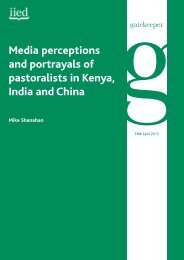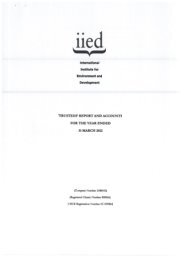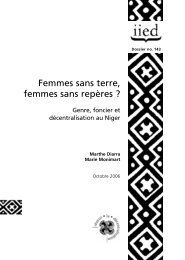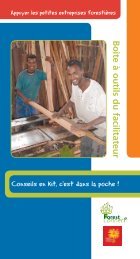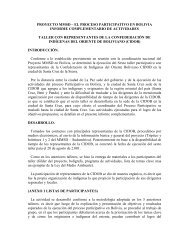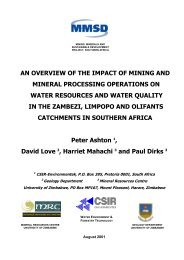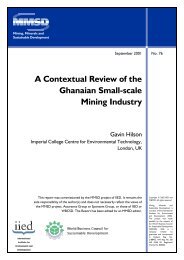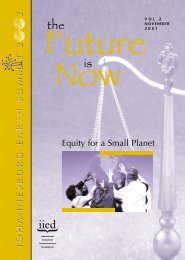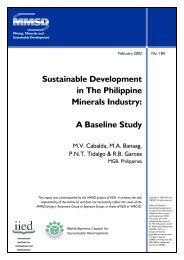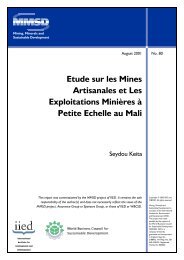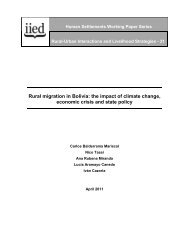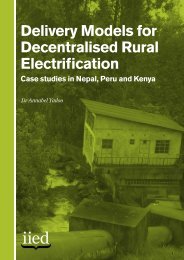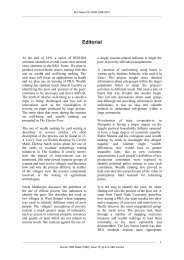Developing pro-poor markets for environmental services in the ...
Developing pro-poor markets for environmental services in the ...
Developing pro-poor markets for environmental services in the ...
You also want an ePaper? Increase the reach of your titles
YUMPU automatically turns print PDFs into web optimized ePapers that Google loves.
spr<strong>in</strong>g source is located, and will give <strong>the</strong>m legal clout to run <strong>the</strong>ir <strong>pro</strong>grammes and <strong>pro</strong>jects<br />
<strong>for</strong> <strong>the</strong>ir watershed.<br />
A second potential source would be <strong>the</strong> <strong>pro</strong>vision of water supply to neighbour<strong>in</strong>g villages.<br />
The LK can actually charge watershed-<strong>pro</strong>tection service fees along with <strong>the</strong> cost of<br />
<strong>pro</strong>vid<strong>in</strong>g water to <strong>the</strong> barangays concerned. If <strong>the</strong>y are able to del<strong>in</strong>eate <strong>the</strong> watershed<br />
boundaries and negotiate successfully with LLDA, <strong>the</strong>y can charge LLDA <strong>for</strong> water supply<br />
that comes from <strong>the</strong>ir tributaries. Should <strong>the</strong> NPC hydropower plant be built <strong>in</strong> <strong>the</strong> future, <strong>the</strong><br />
LK can also tap <strong>the</strong>m as a potential buyer of water from <strong>the</strong> Balian watershed.<br />
The po<strong>in</strong>t of <strong>in</strong>clud<strong>in</strong>g this case study is to hypo<strong>the</strong>sise that <strong>markets</strong> can easily be established<br />
if <strong>the</strong>re are <strong>in</strong>stitutional mechanisms such as <strong>the</strong> LK and <strong>the</strong> SBPTI that are not only<br />
community based, but are very much part of <strong>the</strong> culture of <strong>the</strong> population. Property rights, <strong>in</strong><br />
a way, have been established because of <strong>the</strong> legal mandate of <strong>the</strong> LK to ma<strong>in</strong>ta<strong>in</strong> and<br />
rehabilitate <strong>the</strong> watershed. Meanwhile, <strong>the</strong> SBPTI is <strong>in</strong> charge of ma<strong>in</strong>ta<strong>in</strong><strong>in</strong>g <strong>the</strong> watersupply<br />
system. And because all o<strong>the</strong>r <strong>pro</strong>blems downstream are seen to be directly connected<br />
with <strong>the</strong> watershed, <strong>the</strong> LK <strong>in</strong>advertently applies a comprehensive and <strong>in</strong>tegrated ap<strong>pro</strong>ach <strong>in</strong><br />
manag<strong>in</strong>g <strong>the</strong> watershed. Social acceptability will potentially be high, given that <strong>the</strong>re is<br />
‘ownership’ of <strong>the</strong> organisation by <strong>the</strong> community residents <strong>the</strong>mselves. The only challenge<br />
rema<strong>in</strong><strong>in</strong>g is to conv<strong>in</strong>ce <strong>the</strong> residents to ‘sell’ such <strong>services</strong>, which may <strong>pro</strong>ve to be a<br />
worthwhile task. Not only will it raise money <strong>for</strong> <strong>the</strong>ir organisation, it may even serve as an<br />
alternative livelihood scheme <strong>for</strong> slash-and-burn farmers still operat<strong>in</strong>g <strong>in</strong> <strong>the</strong> area.<br />
3.2.6 Lessons learned<br />
The follow<strong>in</strong>g po<strong>in</strong>ts highlight <strong>the</strong> lessons learned from <strong>the</strong> cont<strong>in</strong>u<strong>in</strong>g success of <strong>the</strong><br />
<strong>in</strong>stitutional set-up of <strong>the</strong> LK and <strong>the</strong> SBPTI <strong>in</strong> <strong>pro</strong>tect<strong>in</strong>g <strong>the</strong>ir watershed.<br />
One of <strong>the</strong>se is communal ownership of <strong>the</strong> manag<strong>in</strong>g <strong>in</strong>stitution. The <strong>for</strong>mation of both <strong>the</strong><br />
SBPTI and <strong>the</strong> LK was <strong>in</strong>itiated by <strong>the</strong> community residents <strong>the</strong>mselves. Government had<br />
noth<strong>in</strong>g to do with sett<strong>in</strong>g <strong>the</strong>m up. NGOs who have worked <strong>in</strong> <strong>the</strong> area likewise attest to <strong>the</strong><br />
pure or unadulterated characteristic of <strong>the</strong>se organisations, such that <strong>the</strong>ir growth was purely<br />
determ<strong>in</strong>ed by <strong>in</strong>ternal dynamics, and was not <strong>for</strong>ced upon <strong>the</strong>m by outside <strong>in</strong>fluence. Thus,<br />
residents have always ‘owned’ <strong>the</strong> organisations, and have always felt <strong>the</strong>y had a major stake<br />
<strong>in</strong> <strong>the</strong> organisations’ <strong>pro</strong>grammes and <strong>pro</strong>jects. Because of this sense of ownership,<br />
commitment to <strong>the</strong>ir activities is very high, fur<strong>the</strong>r ensur<strong>in</strong>g <strong>the</strong> success and growth of <strong>the</strong><br />
organisations.<br />
Ano<strong>the</strong>r lesson is <strong>the</strong> importance of <strong>the</strong> use of cultural traditions <strong>in</strong> <strong>the</strong> organisations’<br />
operations. In relation to <strong>the</strong> above, because <strong>the</strong> residents <strong>the</strong>mselves were runn<strong>in</strong>g <strong>the</strong><br />
organisations, it was natural <strong>for</strong> <strong>the</strong>m to use <strong>the</strong>ir own traditions <strong>in</strong> ensur<strong>in</strong>g smooth<br />
operations. The bayanihan tradition is still very strong, which requires that free labour be<br />
given will<strong>in</strong>gly to help neighbours. Hence, <strong>in</strong> plann<strong>in</strong>g <strong>for</strong> and implement<strong>in</strong>g <strong>the</strong>ir watershed<strong>pro</strong>tection<br />
activities, it was natural <strong>for</strong> <strong>the</strong> members to give <strong>the</strong>ir time and labour <strong>for</strong> free,<br />
without lett<strong>in</strong>g <strong>the</strong>ir <strong>in</strong>dividual opportunity costs get <strong>in</strong> <strong>the</strong> way. This can be <strong>in</strong>terpreted to<br />
mean that <strong>the</strong> value <strong>the</strong>y attach to <strong>the</strong> watershed is higher than <strong>the</strong>ir <strong>in</strong>dividual opportunity<br />
costs. Also, <strong>the</strong> <strong>in</strong>tense religiosity of Filip<strong>in</strong>os was taken advantage of. Conflict resolutions<br />
were done dur<strong>in</strong>g Holy Week, a time when Filip<strong>in</strong>os seriously take stock of <strong>the</strong>mselves and<br />
become very humble and will<strong>in</strong>g to change <strong>for</strong> <strong>the</strong> better.<br />
55



